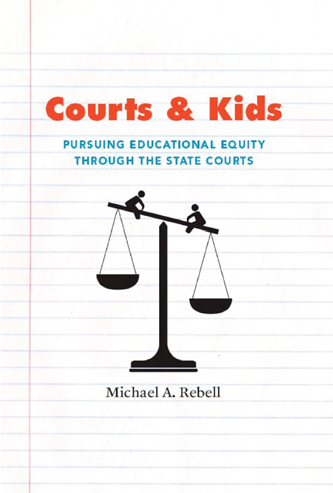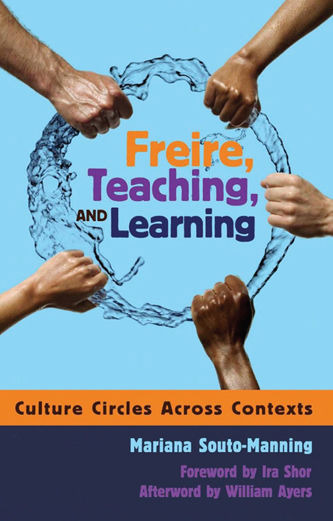Summer Reading
Books by four TC faculty members, ranging in focus from educational equity to adult learning
Michael Rebell
Courts & Kids: Pursuing Educational Equity Through the State Courts
A self-described "child of the 60s," TC Professor of Law and Educational Practice Michael Rebell had a clear direction when he graduated from law school: to litigate cases of court-promoted social reform, especially in the areas of education, desegregation and school decentralization.
A law student during the era of the
In Courts & Kids, Rebell, now the Executive Director of TC's Campaign for Educational Equity, examines a changing landscape in which state courts have become the primary defenders of the vision of educational equity first established in the Supreme Court's ruling in Brown v. Board of Education.
"Attaining success in a sound basic education case…clearly is a formidable task," Rebell writes. "But ensuring a sound basic education for all children is an affirmative mandate of most state constitutions."
Rebell traces the beginnings of that mandate to the early 1970s, when civil rights lawyers first realized that targeting state education finance systems could provide a necessary balancing of funding.
In Courts & Kids, Rebell also assesses the effectiveness of state court in achieving equity. In one example, he looks at Rodriguez v. San Antonio Independent School District, a suit initiated by the parents of a student living in a predominantly Mexican American neighborhood with low property values (and thus low taxes). The plaintiffs argued that the district's finance system was inequitable, given that schools in their neighborhood received approximately half the funds of a neighboring area that was predominantly white. In 1973, the case ultimately reached the Supreme Court, which ruled in favor of the defendant, ruling that "education is not a 'fundamental interest' under the federal Constitution.'"
While that was a short-term setback for the equity movement, it actually galvanized the focus on concentrating the battle at the state level. Subsequent suits emphasized the constitutional right of children to a 'sound, basic' education, rather than creating equal funding for all districts, a strategy that proved enormously successful. To date, education finance systems in no less than forty-five states have been challenged. Rebell offers a comprehensive vision of the courts' role, authority and ultimately, responsibility--as well as thoughts on how policy can support their work.
In pursuit of a "truly democratic educational system," Rebell points out an undeniable truth, "A lot is riding on how conscientiously the courts are willing to carry this constitutional responsibility."
Christopher Emdin
Urban Science Education for the Hip Hop Generation
The medium may be the message, as Marshall McLuhan suggested--but it's also, as any good classroom teacher knows, often the best way of getting students to pay attention.
To that end, TC Assistant Professor of Science Education Christopher Emdin has been using hip hop as a tool to engage young people in learning about photosynthesis and other not-so-easy-to rhyme concepts
Emdin's rich experience in urban classrooms--as researcher, teacher, administrator and student--is the foundation of his book, Urban Science Education for the Hip Hop Generation, released by Sense Publishing in March 2010.
"Full participation in the classroom is a significant, yet under-focused-upon component of teaching and learning," Emdin writes.
Interweaving personal experience with research outcomes, theoretical explanations and student anecdotes, Emdin sheds new light on the causes of educational underachievement among urban youth from the hip hop generation.
"Education and the Hip Hop Generation," a panel held at TC's
An added bonus of this method according to Emdin, is, "You develop a dialogue where students feel responsible for one another and build community."
Eleanor Drago-Severson
Leading Adult Learning: Supporting Adult Development in Our Schools
"My work is inspired by the hope of making schools better places for adults and children," writes Ellie Drago-Severson, TC Associate Professor of Education in the Department of Organization and Leadership, in the preface to her latest book, Leading Adult Learning: Supporting Adult Development in Our Schools, which was released by Corwin Press in September of 2009.
It wasn't until she was in graduate school that Drago-Severson first discovered "adult development" was a field. There she began to explore the relationship between the development of administrators, teachers and other school leaders, and the development of the children in those schools.
In Learning Adult Learning, Drago-Severson draws upon concepts of adult learning, developmental theory, leadership practice and organizational collaboration, making critical links between the growth of school leaders and the children whose development they facilitate. She calls for the firm support of all adults in schools, regardless of their jobs or rank, urging that they be provided with opportunities for "teaming, leadership roles, collegial inquiry and mentoring.
"The work of educators has become dramatically more complex in the 21st century," she writes, "especially since the passage of the No Child Left Behind Act of 2002."
To address the increased demands of accountability and reform management, Drago-Severson also provides practical exercises, including reflective questions that support her "learning-oriented" model.
"There is perhaps no better time to pay this kind of attention to adult development among educators," she concludes.
Mariana Souto-Manning
Freire, Teaching, and Learning: Culture Circles Across Contexts
The Brazilian educational theorist Paolo Freire, who championed education as a means for personal transformation, wrote that "the beauty of education is that it cannot do everything by itself, yet without it all other things cannot be done."
But how do key Freirian concepts of language, culture and class play out in actual classrooms?
That's the focus of Freire, Teaching, and Learning: Culture Circles Across Contexts (Peter Lang Publishers, 2010) by Mariana Souto-Manning, TC Associate Professor in Education.
Like Freire, Souto-Manning views education as a critical tool of democracy, a catalyst for growth and a means of engaging with the real world, instead of the world of ideas exclusively. In telling tales of Freirian pedagogy being applied, Souto-Manning reaffirms the Freirian idea that education is inherently political.
For example, one Freirian-minded principal quoted in the book views authority in the classroom as dialectical, with teachers as learners.
Souto-Manning herself was educated at the Instituto Capibaribe, a progressive school in
Souto-Manning will have published two other books before the year is out: Teachers Act Up! Creating Multicultural Learning Communities through Theatre (Teachers College Press), co-authored with Melisa Cahnmann-Taylor; and Sites of Possibility: Critical Dialogue Across Educational Settings (Hampton Press), which she co-edited.
Published Monday, Jul. 19, 2010



